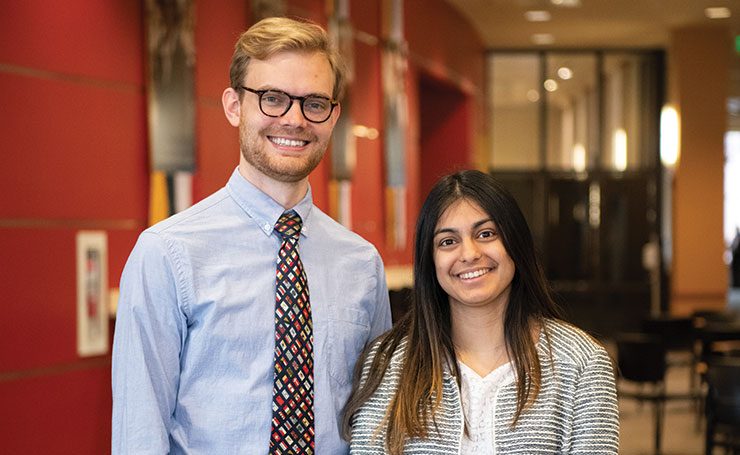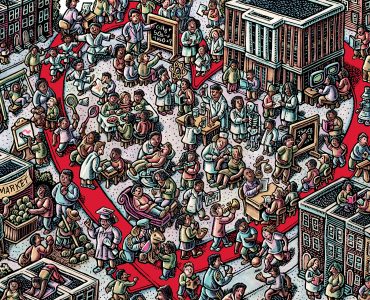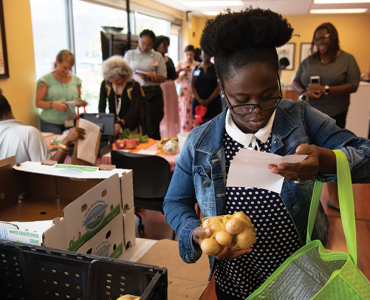oing far away sometimes has benefits close to home.
That is one of the hallmarks of the Center for Global Education Initiatives at the University of Maryland, Baltimore (UMB). As UMB President Jay A. Perman, MD, said when hosting the University System of Maryland Board of Regents last spring, “I know for a fact that the U.S. hasn’t cornered the market on good ideas. People ask why go halfway around the world when you can see terrible devastation halfway around your block? The answer is hundreds of students and faculty who tell me how they’re taking a lesson they learned abroad and applying it to an intractable problem here at home.”
Two students who did just that echoed Perman’s remarks to the regents that day.
When University of Maryland Carey School of Law student Suhani Chitalia, JD ’19, learned through an Environmental Law Society meeting that UMB had a burgeoning program in Malawi, her interest was piqued. She and one other student spent two months in the southeast African nation working with students at the University of Malawi Chancellor College Faculty of Law, the country’s only law school.
“Learning in an international realm is difficult — you need to understand a different government structure, read a different constitution,” she says, “but it’s a good skill set to have because in law you need to be able to think on your feet and understand law from different perspectives.”
UMB has a strong commitment to providing opportunities for students like Chitalia to go abroad and bring their knowledge back stateside. The Center for Global Education Initiatives administers a grant program to fund interprofessional teams of faculty and students taking part in research, training, and service-learning projects. Additionally, the University joined the American Council on Education’s Internationalization Lab to ensure that global learning opportunities are woven into the fabric of curricula.
Said Perman, “We have deep capacity at UMB to influence health, well-being, and justice on the global stage, and more of our students must be able to access international opportunities not only to improve the human condition, but to develop their global engagement and global competency.”
We have deep capacity at UMB to influence health, well-being, and justice on the global stage.”
President Jay A. Perman, MD
While Chitalia’s trip was her first abroad, Michael Sikorski, a third-year MD/PhD candidate in the Medical-Scientist Training Program in the University of Maryland School of Medicine, began studying abroad as an undergraduate. He’s since spent time working on research projects in Chile and is now part of a two-year program researching typhoid epidemiology and genomics overseen by the Ministry of Health in Samoa.
Like Chitalia, who used WhatsApp to find housing in a hostel in Malawi, Sikorski found his own way in Samoa, connecting with a host family through Facebook. Samoa is a tiny country and it was not uncommon for Sikorski to interact directly with high government officials, even within his host family (his host father’s brother is the minister of finance). He notes that staying with an intergenerational host family proved an important part of his overseas education.
“It was special to hear stories from locals about their concerns not only about health issues but also environmental issues,” he states. “There are perspectives I was able to be exposed to through my host family I would not have had if I’d stayed in a hotel.”
Sikorski anticipates a career in global health. In addition to mentors at UMB, he’s been inspired by a team leader in Samoa who has experience in pediatric critical care. Sikorski would like to work at an academic institution where he can balance a portfolio of international projects with clinical work at home. He says the ideas and influences one obtains from abroad are invaluable at home.
“We as a country need to do a better job of listening and learning, especially to those countries that are more progressive in how they handle their vulnerable populations,” states Sikorski, who will return to Samoa for several months this fall and again in spring to study typhoid behavior in wet and dry seasons. “Any information I learn overseas would always be complemented well by projects in, for example, West Baltimore, where I could transfer those ideas here.”
In Malawi, Chitalia found warm, welcoming people in a beautiful country known for its lakes. Those lakes became Chitalia’s classroom. A student of environmental justice, part of her program directive was to conduct site visits in the Zomba region to identify problems and resources to combat those challenges. One such site visit, to Lake Chilwa, was particularly profound as the body of water is the main source of food and transportation for its residents, yet it is wracked by over-fishing and pollution, problems complicated by politics because the lake is shared with neighboring Mozambique.
Having just completed an internship where she created a tool kit to assess environmental justice in Maryland’s Prince George’s County, Chitalia tweaked that tool kit to work in Malawi.
“The tool kit is a miniature plan to address environmental justice and breaks it into five or six categories depending on what issues are present in the region,” she explains. “In Malawi, we focused on deforestation, energy management, water pollution, and agriculture.”
On her trip, Chitalia learned that systemic change doesn’t happen overnight. “I went in with high hopes to make a change I could see,” she says, “but it was a good lesson that law is a process. We’re not there to put on a Band-Aid; we’re there to heal a wound and be part of something bigger.”
In August, Chitalia began work at American Rivers, an environmental organization that combines national advocacy with field work in key river basins. Chitalia is doing work similar to what she did in Malawi, assessing environmental issues impacting the Chesapeake Bay and collaborating with regional nonprofits to identify solutions.
“I think law students don’t see the point in studying law outside the state or jurisdiction where they’re going to practice,” Chitalia explains. “However, it’s not just about learning the law, it’s about learning a skill set, about being more cultured and bringing a different perspective to the law.”And that’s something that is important in West Baltimore as well as southeast Africa. C




